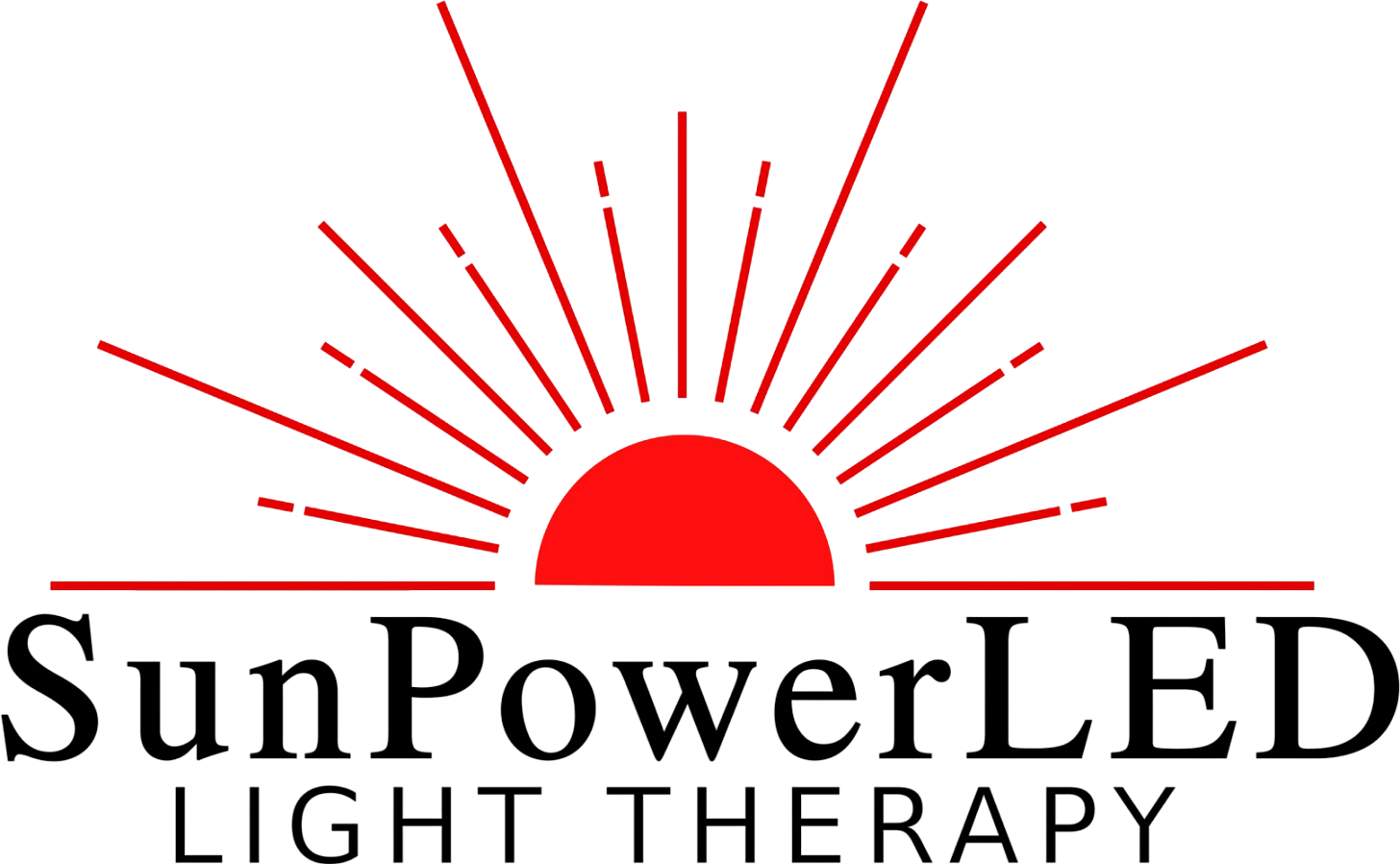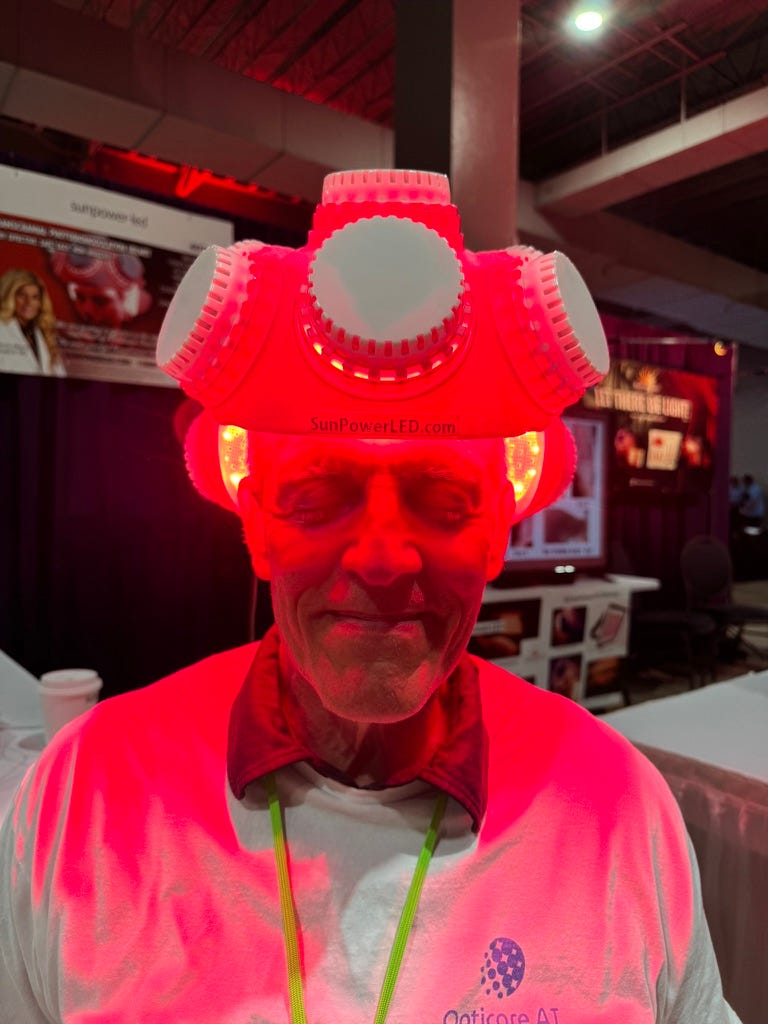Personal Science Week - 250306 Biohacker Expo
Testing products at Biohacker Expo, plus new clinical studies to consider
The Biohacker Expo last weekend in Miami didn’t disappoint anyone looking to check out the latest personal science gadgets first-hand.
I tried a new photobiomodulation device. What did I learn?
Biohacker Expo
Sandy Martin used to run big comic conventions until mold caused her such health problems that she was forced to use personal science techniques to get relief. After recovering, she started the Biohacker Expo. I was one of a thousand people watching the sessions and visiting the dozens of small exhibitors showing off the latest in personal biohacking products.
One of the biggest ideas is Near Infrared Light Therapy, also known as photobiomodulation (PBM). Several exhibitors showed off various products that shoot light waves into your body, supposedly delivering energy to stimulate healing. The idea is that your cell mitochondria can get a power boost from external light sources—if the energy comes in the right frequency. Specific frequencies of red light, they claim, can make it through the skin to directly stimulate your cells. You feel this on a small scale when you go out in direct sunlight; Red Light Therapy just brings the most productive elements of the spectrum to you more efficiently.
I tried one product, from SunPowerLED, a Canadian company whose CEO tells me their product is special because it can deliver far more power. Using special cooling technology, their $6500 Transcranial PBM Helmet can be customized to offer 660nm and 1050nm wavelengths at 24 mW/cm^2. They claim that’s easily enough to penetrate parts of the skull and into brain cells, delivering miraculous benefits to people suffering from everything from concussions to Alzheimers and Parkinsons.
So what happened after shooting light at 700 and 1200 nm into my head?
Answer: I felt warm, and surprisingly relaxed, but if there were any quantifiable benefits I wasn’t able to measure them. I tested myself before/after using my company’s Opticare retinal camera—which should be sensitive enough to tell extremely minute changes in blood or nervous system flow—but didn’t see anything unusual.
Of course, I only attempted one session, for less than 15 minutes total. The makers say that to see significant benefits, I’d need to continue using the helmet daily for much longer.
Clinical Studies
Professional researchers are always looking for volunteers who will participate in clinical trials, often in exchange for early access to products under development. Most of the trials will also give you access to any raw data they collect from you, and often you’ll have direct contact with the people running the trial, who I’ve found are always eager to give you personal attention if you show interest in their study.
People Science is running a clinical trial of a supplement (Hericium erinaceus) to help older people with cognition. You must be over 40. Sign up here
I’m ineligible because I’m already doing a different study with them.
If you’re trying to lose weight, consider joining Northwestern University’s 12-month “lifestyle and weight loss” EVO study. You’ll get one-on-one coaching, personalized diet goals, and some “equipment” (not sure what) to use during the study.
We’ve mentioned our friends at Tastermonial many times, and they are always running interesting studies, often involving (free) samples of food products.
Also see Eureka Health from UC-San Francisco, which has a number of studies, from Parkinsons to cancer. I’m participating in one of their heart studies, where I give them access to my Apple Health data, which they will use over time to find associations that can predict heart disease. So far I haven’t received anything special in exchange for my data, but I want researchers like them to have more real-life data from people like me.
Personal Science Weekly Readings
Writing your own apps is getting to be so easy now that there’s little excuse for any personal scientist to not build exactly the tracking app they want. Omar Saleem shows how he used Replit Agent to build a custom health dashboard.
Stop using ulcers as an example of how mainstream medicine resisted the truth until a lone heretic drank some H. Pylori to prove they were wrong.
Julia Belluz spent a day in an airtight metabolic chamber (2018) and (surprise!) learned that (1) most of her metabolism is steady, day and night, regardless of what she does or eats, (2) she seriously under-estimates how much food she eats.
Reminder: Just ignore health studies based on letting people report what they ate. An old article from The Verge explains how tempting it is for study volunteers to lie.
Stuart Richie offers the term pseudocritic to describe somebody who snipes at a new research result with picky and often irrelevant criticisms. It’s easy to find fault with scientific results – there are entire websites now and research agendas focused on the “replicability crisis”. But sometimes criticism is too easy, such as dismissals based on too little data — after all, who doesn’t want more data? Pseudocritics, in their zeal for some imagined perfection, can cause more harm than good when they push the sense that research must always have dramatic conclusions for it to be useful. Much dramatic – and non-replicable – research might never have been published if scientists were more eager to embrace small but meaningful effects rather than headline-grabbing but often incorrect ones.
Read more of Ritchie’s thoughts about replicability, as well as other great discussions in the online journal Asterisk.
About Personal Science
Personal scientists use the scientific method for personal rather than professional reasons. We believe that science is a set of tools and techniques that anyone can use, not just credentialed experts. While we respect professional research, we know that population studies often miss what matters most: whether something works for you. Each of us is an outlier, which is why personal scientists collect our own data, run our own experiments, and draw our own conclusions. We're both open-minded and skeptical, willing to entertain unconventional ideas while demanding evidence before acceptance. You’ll make better decisions about health, productivity, and well-being when you focus on what actually works for you as individuals. If you're curious about the world and prefer to think for yourself rather than blindly trust authorities, you might be a personal scientist too.
If you have other topics you’d like to discuss, please let us know.





